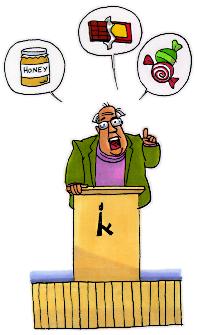There are two types of
Jews at Hanukkah time. There are those who believe that Israelis eat jelly
donuts on Hanukkah because the oil in which the donuts are fried is connected
to the miracle commemorated on Hanukkah. Others hold that Israelis eat jelly
donuts because somehow the sweetness of the jelly inside is related to the
festival. Etymologically, if not historically, "Others" have a good
case.
Some readers may remember
having learned that  (hannuka)
is so called because
(hannuka)
is so called because (hanu khaf heh), "They [the Maccabees] rested on the 25th [of
Kislev]." Quaint idea; wrong shoresh (root-word). Scripture records
many types of
(hanu khaf heh), "They [the Maccabees] rested on the 25th [of
Kislev]." Quaint idea; wrong shoresh (root-word). Scripture records
many types of  (hanukkah)
before the clash of Antiochus Epiphanes and Judah Maccabee. None of them speaks
of "resting," from the root
(hanukkah)
before the clash of Antiochus Epiphanes and Judah Maccabee. None of them speaks
of "resting," from the root  (het,
nun, heh); all of them are related to inauguration, from
(het,
nun, heh); all of them are related to inauguration, from  (het, nun, khaf). Deuteronomy teaches, for example, that a man who
has built a new house
(het, nun, khaf). Deuteronomy teaches, for example, that a man who
has built a new house  (ve-lo hanakho), "and has not dedicated it," is exempt from
military service.
(ve-lo hanakho), "and has not dedicated it," is exempt from
military service.
A second verbal form derived from our root has to do with the initiating the
young into the Jewish community via education. The Book of Proverbs tells
us  (hanokh la-na'ar), "educate the youth" in a way appropriate
for him and he will continue to behave properly into old age. It may fairly
be said of Eliezer Ben Yehuda, the Hebrew
(hanokh la-na'ar), "educate the youth" in a way appropriate
for him and he will continue to behave properly into old age. It may fairly
be said of Eliezer Ben Yehuda, the Hebrew  (mehanekh), educator, par excellence, that he almost single-handedly
(mehanekh), educator, par excellence, that he almost single-handedly
 (hanakh tekufa hadasha), inaugurated a new era, for the Jewish people
(hanakh tekufa hadasha), inaugurated a new era, for the Jewish people
And what does all this have to do with jelly donuts? If we remember that the
letter  (nun) has a habit of slipping in and out of words, we come to the two-letter
root-word
(nun) has a habit of slipping in and out of words, we come to the two-letter
root-word  (hekh), palate. This word is found in a whole range of idiomatic expressions,
from the phrase in the Jewish pledge of allegiance to Jerusalem,
(hekh), palate. This word is found in a whole range of idiomatic expressions,
from the phrase in the Jewish pledge of allegiance to Jerusalem,  (tidbak leshoni le-hiki), "may my tongue cleave to the roof of
my mouth" to the expression for "a really fine orator,"
(tidbak leshoni le-hiki), "may my tongue cleave to the roof of
my mouth" to the expression for "a really fine orator,"  (hiko mamtakim), literally "his palate is [like] sweets."
(hiko mamtakim), literally "his palate is [like] sweets."
More to our point, and sweeter yet, is an ancient initiatory ceremony in which
the  (hekh), palate, of a young pupil was rubbed with date honey, so that
the child would associate learning with sweetness (there is a similar ceremony
using honey.) In Arabic, this palate-rubbing ceremony of initiation is called
hanakka. Both the meaning and the sound of this Arabic word make the
connection between
(hekh), palate, of a young pupil was rubbed with date honey, so that
the child would associate learning with sweetness (there is a similar ceremony
using honey.) In Arabic, this palate-rubbing ceremony of initiation is called
hanakka. Both the meaning and the sound of this Arabic word make the
connection between  (hekh), palate, and
(hekh), palate, and  (hinnukh), education, on the one hand, and the ceremonial aspect of
Hannuka , on the other, more readily apparent.
(hinnukh), education, on the one hand, and the ceremonial aspect of
Hannuka , on the other, more readily apparent.



